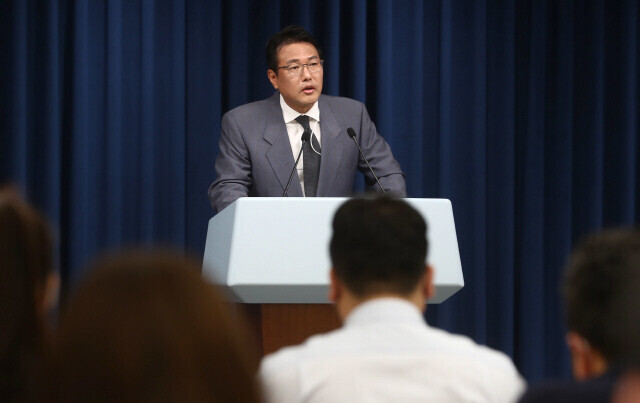hankyoreh
Links to other country sites 다른 나라 사이트 링크
National security advisor’s ouster could afford hard-liner Kim Tae-hyo stronger influence

With the abrupt resignation of Kim Sung-han, who as director of the National Security Office served as the Yoon Suk-yeol administration’s de facto head of foreign and security affairs since its inauguration, there has been speculation that his more hard-line No. 2, Kim Tae-hyo, will enjoy even stronger influence.
Kim Tae-hyo, the first deputy director of the NSO, is known to be a much stronger supporter of closer ties with Japan than Kim Sung-han was. The deputy director is expected to bolster Japan-oriented foreign policy, such as by strengthening trilateral cooperation between South Korea, the US, and Japan.
Kim Tae-hyo and Kim Sung-han were seen as a two-horse carriage in the Yoon Suk-yeol government’s diplomacy and security line. Despite the difference in age and rank with Kim Sung-han, Kim Tae-hyo is known for his strong, assertive personality.
Kim Sung-han was once a classmate of Yoon’s in elementary school and his “private tutor” for diplomatic and foreign affairs. The NSO chief, however, was suddenly replaced on Wednesday, leaving Kim Tae-hyo as the last remaining highest-ranking foreign affairs and security staff member at the presidential office. Shin In-ho, former second deputy chief at the NSO, resigned last August due to health reasons.
Although his direct Lee Moon-hee was dismissed as a result of omitting information from reports to the presidential office about holding a joint Blackpink-Lady Gaga concert proposed by the US, Kim Tae-hyo was able to come out of the situation unscathed. The reporting about the concert issue is also the apparent reason Kim Sung-han was replaced.
This further illustrates Yoon’s trust in Kim Tae-hyo. The first deputy director used to be Yoon’s neighbor at an apartment complex before the president moved into his official residence. It seems that Kim Tae-hyo’s “advice” and “assistance” will be difficult to ignore until Cho Tae-yong, who was appointed as the new NSO head, adapts to the Yongsan way of doing things.
Kim Tae-hyo also worked hand-in-hand with First Vice Foreign Minister Cho Hyun-dong, who has been tapped as the new ambassador to the US, and worked closely with the Blue House in the past in his position as a presidential secretary for external affairs and strategies under the Lee Myung-bak administration.
The first deputy director has also long maintained a pro-Japan diplomatic policy line. Unlike Kim Sung-han or Minister of Foreign Affairs Park Jin, he has long advocated for radical advancements in bilateral relations with Japan, such as through the South Korea-Japan summit and the process of coming up with a “solution” for victims of Japanese colonial era forced labor.
While Kim Sung-han and Park Jin had concerns about breaking too much with the public during the South Korea-Japan summit, Kim Tae-hyo adopted a more aggressive approach, arguing that “even if the approval ratings decline, we must improve relations.” Saying he would “take responsibility,” his approach was completely in line with what Yoon wanted.
“It is hard to deny that there were disagreements between Kim Sung-han and Kim Tae-hyo,” a presidential office official said, adding that “as a result, first deputy director Kim was the one to accurately understand what president Yoon was thinking.”
Kim Tae-hyo also led the country’s foreign policy toward Japan under the former Lee Myung-bak administration.
Kim, who was called a big shot in foreign affairs circles at the time, worked as presidential secretary for external affairs and strategies and focused on promoting the government's hardline stance toward North Korea and improving relations with Japan, all while being backed by Lee’s full confidence in him.
In 2012, however, he was fired after being blamed for the closed-door push for the General Security of Military Information Agreement (GSOMIA) between South Korea and Japan.
Meanwhile, after Yoon presented Cho Tae-yong with his letter of appointment for his new post on Wednesday, he took a group photo with NSO staff of rank higher than secretary.
“I think it is absolutely necessary for all members of the presidential office, including the NSO, to work together in unison and as one team,” Cho told reporters, in an attempt at straightening out the chaotic atmosphere.
By Kim Mi-na, staff reporter
Please direct questions or comments to [english@hani.co.kr]

Editorial・opinion
![[Column] Is Korean democracy really regressing? [Column] Is Korean democracy really regressing?](https://flexible.img.hani.co.kr/flexible/normal/500/300/imgdb/original/2024/0705/2917201664129137.jpg) [Column] Is Korean democracy really regressing?
[Column] Is Korean democracy really regressing?![[Column] How tragedy pervades weak links in Korean labor [Column] How tragedy pervades weak links in Korean labor](https://flexible.img.hani.co.kr/flexible/normal/500/300/imgdb/original/2024/0703/8717199957128458.jpg) [Column] How tragedy pervades weak links in Korean labor
[Column] How tragedy pervades weak links in Korean labor- [Column] How opposing war became a far-right policy
- [Editorial] Korea needs to adjust diplomatic course in preparation for a Trump comeback
- [Editorial] Silence won’t save Yoon
- [Column] The miscalculations that started the Korean War mustn’t be repeated
- [Correspondent’s column] China-Europe relations tested once more by EV war
- [Correspondent’s column] Who really created the new ‘axis of evil’?
- [Editorial] Exploiting foreign domestic workers won’t solve Korea’s birth rate problem
- [Column] Kim and Putin’s new world order
Most viewed articles
- 110 days of torture: Korean mental patient’s restraints only removed after death
- 2What will a super-weak yen mean for the Korean economy?
- 3Real-life heroes of “A Taxi Driver” pass away without having reunited
- 4Koreans are getting taller, but half of Korean men are now considered obese
- 5End of an era? Fans wait to see what Billboard rule changes will do to BTS rankings
- 6Former bodyguard’s dark tale of marriage to Samsung royalty
- 7[Column] Is Korean democracy really regressing?
- 8Can the IPEF deliver the US dream of an Asian economy without China?
- 9Japan’s lack of transparency on Fukushima water is sparking fear in neighbors, says Japanese expert
- 10Beleaguered economy could stymie Japan’s efforts to buoy the yen